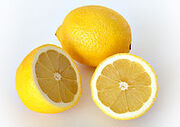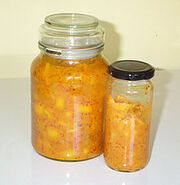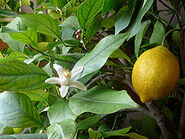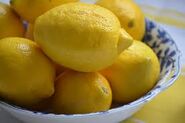The lemon is a small evergreen tree native to Asia, and the tree's ellipsoidal yellow fruit. The fruit is used for

culinary and non-culinary purposes throughout the world, primarily for its juice, though the pulp and rind (zest) are also used in cooking and baking. The juice of the lemon is about 5% to 6% citric acid, which gives lemons a sour taste. The distinctive sour taste of lemon juice makes it a key ingredient in drinks and foods such as lemonade.
History[]
The origin of the lemon is a mystery, though it is thought that lemons first grew in Southern India, northern Burma, and China. A study of the genetic origin of the lemon reported that it is a hybrid between sour orange and citron.
Lemons were known to the Jews of Jerusalem, who, according to Josephus, pelted an errant high priest with them during a festival in the 90s BC, although Jewish tradition maintains that this was done with citrons, not lemons. They entered Europe near southern Italy no later than the 1st century AD, during the time of Ancient Rome. However, they were not widely cultivated. They were later introduced to Persia and then to Iraq and Egypt around 700 AD. The lemon was first recorded in literature in a 10th-century Arabic treatise on farming, and was also used as an ornamental plant in early Islamic gardens. It was distributed widely throughout the Arab world and the Mediterranean region between 1000 and 1150.
The first substantial cultivation of lemons in Europe began in Genoa in the middle of the 15th century. The lemon was later introduced to the Americas in 1493 when Christopher Columbus brought lemon seeds to Hispaniola on his voyages. Spanish conquest throughout the New World helped spread lemon seeds. It was mainly used as an ornamental plant and for medicine. In the 19th century, lemons were increasingly planted in Florida and California.
In 1747, James Lind's experiments on seamen suffering from scurvy involved adding lemon juice to their diets, though vitamin C was not yet known.
Uses[]
There are many uses for lemons, and their juice.
Culinary[]
Lemon juice, rind, and zest are used in a wide variety of food and drink. Lemon juice is used to make lemonade,

lemon pickle
soft drinks, and cocktails. It is used in marinades for fish, where its acid neutralizes amines in fish by converting them into non-volatile ammonium salts, and meat, where the acid partially hydrolyzes tough collagen fibers, tenderizing the meat, but the low pH denatures the proteins, causing them to dry out when cooked. Lemon juice is frequently used in the United Kingdom to add to pancakes, especially on Shrove Tuesday.
Lemon juice is also used as a short-term preservative on certain foods that tend to oxidize and turn brown after being sliced, such as apples, bananas and avocados, where its acid denatures the enzymes that cause browning and degradation.
Lemon juice and rind are used to make marmalade and lemon liqueur. Lemon slices and lemon rind are used as a garnish for food and drinks. Lemon zest, the grated outer rind of the fruit, is used to add flavor to baked goods, puddings, rice and other dishes.
Preserved lemons are a part of Moroccan cuisine. They are also one of the main ingredients in many Indian cuisines. Either lemon pickle or mango pickle is part of everyday lunches in Southern India.
The leaves of the lemon tree are used to make a tea and for preparing cooked meats and seafoods.
Others[]
Industrial[]
Lemons were the primary commercial source of citric acid prior to the development of fermentation-based processes.
Cleaning[]
The juice of the lemon may be used for cleaning. A halved lemon dipped in salt or baking powder is used to brighten copper cookware. The acid dissolves the tarnish and the abrasives assist the cleaning. As a sanitary kitchen deodorizer the juice can deodorize, remove grease, bleach stains, and disinfect; when mixed with baking soda, it removes stains from plastic food storage containers. The oil of the lemon's peel also has various uses. It is used as a wood cleaner and polish, where its solvent property is employed to dissolve old wax, fingerprints, and grime. Lemon oil and orange oil are also used as a nontoxic insecticide treatment.
Medicine[]
Lemon oil may be used in aromatherapy. Researchers at The Ohio State University found that lemon oil aroma does not influence the human immune system, but may enhance mood.
Additional Uses[]
One educational science experiment involves attaching electrodes to a lemon and using it as a battery to produce electricity. Although very low power, several lemon batteries can power a small digital watch. These experiments also work with other fruits and vegetables. Lemon juice is also sometimes used as an acid in educational science experiments.









